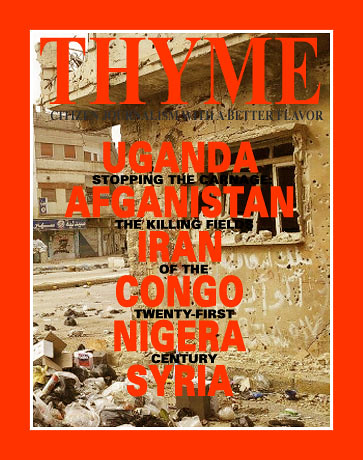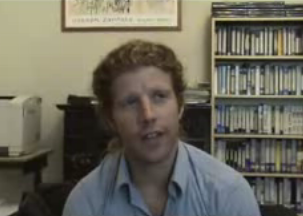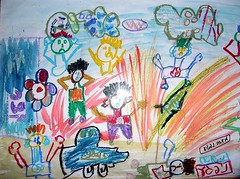
Volume IV, Issue X
The Deadly World We Live In Today
Recently my lovely wife and I watched Hotel Rwanda, the true story of Paul Rusesabagina, the manager of the Sabena Hôtel des Mille Collines, a Hutu married to a Tutsi, Tatiana. During the Hutu extermination of the Tutsi, Rusesabagina shelters refugees from the conflict in the hotel and eventually they find their way to freedom. He works to get their story told to an international audience, hoping that will lead to help in ending the atrocities.
When the news media finally run the story, Rusesabagina says: "Now help will come." The reporter responds: "No, they'll exclaim that it is terrible and go back to their dinners." Indeed, the 24/7 continual feed of sensory overload does not automatically lead viewers to informed involvement. On the contrary, it may make many of us immune to the suffering of our fellows.

Paul Rusesabagina.
Afghanistan exploded recently as outrage over the burning of defaced Quorans resulted in the deaths of four American soldiers at the hands of supposedly friendly Afghan troops. Even more saddening was the news that over seventy Afghans died in the violence. We wept for the four, but do we weep also for the seventy?
In the wreckage of the Second World War, the United Nations was formed in the hopes of stopping such sensless conflicts and killing. In Hotel Rwanda, the inability, or lack of will to stop so much of the world's carnage is vividly portrayed.
Social media offers the promise that the printing press offered to generations past as an agent of change. I have received the Joseph Kony 2012 video from a number of friends and family members. This would seem to be a most welcome development in a world that is immune to others' suffering. Indeed, Kony deserves to be called out for his atrocities.
The problem of social media as a change agent is perhaps best summed up in this blog post from Ugandan Journalist Rosebell Kagumire:
"For the last many hours I have followed a campaign by Invisible Children NGO called KONY2012 that has gone viral getting more than 20 million hits on Youtube. I am a story teller and i know the danger of a single story . It is something many people can easily ignore especially if we are outsiders to the story.
This is the Video [cick to watch] that I recorded late in the night. It’s longer than i would have wanted but i just wanted to put my views out there on a conflict I have covered as a journalist and a people I have worked among as a communications officer at Isis-WICCE. I don’t in any way think I represent views of Uganda like some comments I have seen. This is me talking about the danger of portraying people with one single story and using old footage to cause hysteria when it could have been possible to get to DRC and other affected countries get a fresh perspective and also include other actors."
Another danger is when the storyteller, or the media takes sides. Israel is often portrayed as the opressor of the Palestinians, yet little background is given, such as the history of the region and the refusal of neighboring Arab states to assimilate the Arabs who fled the region in 1947, believing they would soon return led by the victorious Arab conquerers [1]. Likewise few will ruminate over the 1951 expulsion of Jews from Baghdad and how they were subsequently assimilated into Israel [2]. The Nakba Narrative remains unquestioned in the minds of many [3].
As Binyamin Netanyahu stated in his recent speech, Israel is the only nation in the Middle-East that offers rights to religious minorities. There are Arabs serving in the Knesset! Netanyahu makes the point that his nation is not perfect and often deserving of criticism [4]. Despots make no such claims of vulnerability. At least I don't hear Syria's Bashar al-Assad making such statements. Human Rights groups, such as Human Rights Watch and Amnesty International, have detailed how Bashar's regime and secret police routinely tortured, imprisoned, and killed political opponents, and those who speak out against the regime. The 'other' weekly news magazine addresses this in the current issue.
Iran's Mahmoud Ahmadinejad regularly promises to eliminate Israel and the United States. His nuclear ambitions should have people taking him seriously. The death sentence pronounced on Iranian pastor Yousef Naderkhani should call into question the human rights policies of the Iranian regime.
What might the answer be? Perhaps it lies in our being willing to hear the real stories of those who live in dangerous places in the world. At the very least their stories might give us new appreciation of the free and secure society our forefathers bled to give us.
Sick and Tired of the Middle East [click to read]. Perspective from Victor Davis Hanson in Jewish World Review.
Syrian Christians Fear for Survival [click to read] by Alexandra Zavis in Jewish World Review.

Noam Bedein's Mission is Unique, But It's Not New
"But when Sanballat the Horonite, Tobiah the Ammonite official and Geshem the Arab heard about it, they mocked and ridiculed us. "What is this you are doing?" they asked. "Are you rebelling against the king?" -- (Nehemiah 2:19)

Noam Bedein, Founder of Sderot Media
I frankly expected someone much older. The website I discovered while trying to get perspective on the situation in Southern Israel Sderot Media [click to read], is the creation of Noam Bedein, a young man in his twenties. Just like Nehemiah of old, Bedein saw the perilous situation of his beloved city and became both advocate and activist to change things. In the face of opposition from the Western Media, Uninformed pressure from Western Leaders and downright hostility from Hamas, the young photojournalist found his mission to tell Sderot's story and work for the healing of her people. Bedein’s ultimate goal is: "to make people aware of the crisis and present the Israeli perspective that is not often portrayed accurately in the media."
Bedein has lived through about 7000 rockets raining down on the city, who's population consists largely of new immigrants [many from Russia] who are simply too poor to move elsewhere. Many of the citizens are dug in to stay, fearing their exodus would simply create a vacuum for terrorists to move in.
Through Sderot Media, he has also founded Sderot Community Treatment Theater. This theatre project helps young residents of Sderot suffering from post traumatic stress syndrome.
Who is Manee Singmueangphon?
...And Why You Need to Know
Every now and then I check in on Noam Bedein's site: Sderot Media [click to read] and pray for the safety of the residents of this city in Southern Israel. Manee Singmueangphon is a Thai greenhouse worker who was killed in a rocket atack recently. He worked alongside other Thais and Nepali guest workers in Israel's agriculture industry. He was 33 years old, a husband and father who's death left a grieving family back in Thailand.
Sderot Media Has More [click to read] on the tragic death of Mr. Singmueangphon and why the media needs to get an understanding of the type of terror attacks being made on Sderot by Hamas.
"As long as the world tolerates those Islamic jihadists who fire rockets against innocent Israeli civilians and accepts their legitimization for it, terrorism will continue to strike innocent civilians everywhere. The killing of Manee Singmueangphon by a Gaza rocket should serve as a constant reminder that people of all nationalities are indiscriminate victims of Iranian-sponsored Islamic terrorism."

A child's drawing from Sderot shows
the horror of war.

Sderot children have fifteen seconds to reach this pipe
when the missles start coming in.
Photo courtesy of www.sderotmedia.com





No comments:
Post a Comment